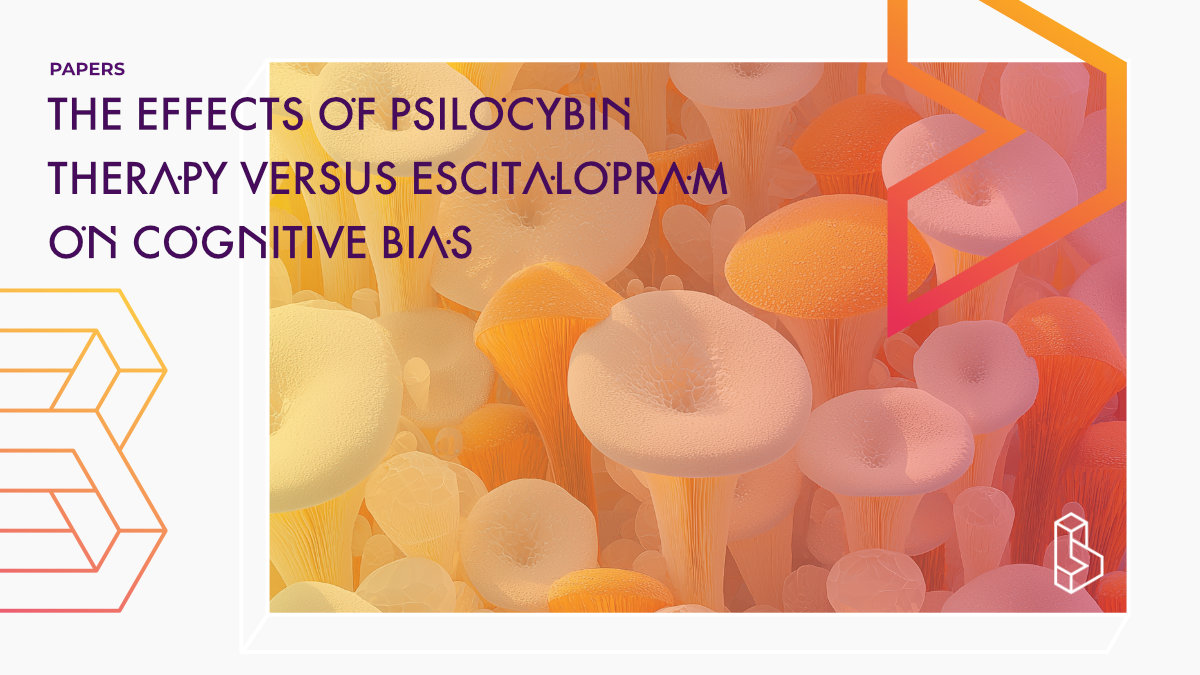This secondary analysis of an RCT comparing psilocybin therapy to escitalopram in MDD patients (n=59) found that psilocybin produced superior improvements in cognitive biases. Psilocybin significantly increased self-reported optimism (d=1.1) and optimistic beliefs about desirable life events (d=1.1), while improving all three domains of dysfunctional attitudes (achievement, dependency, and self-control). Escitalopram showed more modest effects, reducing pessimism about negative events and improving only the achievement domain of dysfunctional attitudes.
Abstract The effects of psilocybin therapy versus escitalopram on cognitive bias
“Background: Patients with Major Depressive Disorder (MDD) have more dysfunctional attitudes than healthy individuals and these pessimistic biases are correlated with depression severity. Psilocybin has demonstrated sustained remission in depression.
Methods: Secondary analysis of a two-arm randomized controlled trial assessing the effect of psilocybin therapy versus escitalopram on ‘maladaptive’ cognitive biases relevant to the construct of depression. Primary outcomes were post-treatment changes in biases at six weeks compared with baseline, as measured using three validated psychological scales.
Findings: Fifty-nine MDD patients were randomly allocated to the psilocybin (n = 30) or escitalopram (n = 29) groups. Self-reported optimism showed a large increase six-weeks after psilocybin treatment (Mdiff=6⋅63 p < 0⋅0001; 95 % CI [4⋅06, 9⋅20], d = 1⋅1), whereas there was no change following escitalopram (Mdiff=1⋅52, p = 0⋅205; 95 % CI [-0⋅59, 3⋅62], d = 0⋅4). Behavioral results found that patients were more optimistic about desirable life events after psilocybin treatment (Mdiff=0⋅16, p = 0⋅0002; 95 % CI [0⋅08, 0⋅23], d = 1⋅1), but they were also less pessimistic about negative life events after escitalopram treatment (Mdiff=0⋅07, p = 0⋅018; 95 % CI [0⋅01, 0⋅13], d = 0⋅5). We found improvements in all three domains of dysfunctional attitudes following psilocybin treatment: achievement (Mdiff=10⋅37, p < 0⋅0001; 95 % CI [6⋅38, 14⋅53], d = 1⋅0); dependency (Mdiff=7⋅97, p < 0⋅0001; 95 % CI [4⋅00, 11⋅93], d = 0⋅9) and self-control (Mdiff=6⋅40, p = 0⋅0006; 95 % CI [2⋅60, 10⋅20], d = 0⋅8)), whereas only the achievement domain improved after escitalopram (Mdiff=4⋅10, p = 0⋅005; 95% CI [1⋅35, 6⋅86], d = 0⋅6).
Interpretation: These results suggest that two high-dose sessions with psilocybin therapy are superior to a six-week daily course of a selective serotonin-reuptake inhibitor antidepressant, in remediating negative cognitive biases in depression.“
Authors: Jessica Henry, Bruna Giribaldi, David J. Nutt, David Erritzoe, Robin L. Carhart-Harris & Taylor Lyons
Summary of The effects of psilocybin therapy versus escitalopram on cognitive bias
Major Depressive Disorder (MDD) is a significant contributor to the global burden of disease and is linked to high rates of work absenteeism. Current standard treatments typically include selective serotonin reuptake inhibitors (SSRIs) and cognitive behavioural therapy (CBT). However, these approaches often fail to produce sustained remission in many patients. A central concept in the understanding of MDD is the presence of maladaptive cognitive schemas—rigid and pessimistic thought patterns about the self, others, and the future—which increase susceptibility to depression and are maintained through repeated negative reinforcement during depressive episodes.
Earlier research has established that people with MDD tend to have elevated levels of dysfunctional attitudes and display pessimistic cognitive biases. These include exaggerated beliefs about personal failure, dependency on others, and a need for control. The severity of these biases typically correlates with the severity of depression. CBT aims to challenge and modify these dysfunctional cognitions to alleviate symptoms. In recent years, psilocybin—a psychedelic compound that activates serotonin 2A receptors (5-HT2AR)—has shown promise in rapidly reducing depressive symptoms, potentially by enhancing neuroplasticity and cognitive flexibility. The current study by Henry and colleagues expands on this work by directly comparing the impact of psilocybin therapy to escitalopram (a common SSRI) on cognitive biases in MDD.
Experimental Procedures
Study Design and Participants
Find this paper
https://doi.org/10.1016/j.euroneuro.2025.06.003
Paywall | Google Scholar | Backup | 🕊
Cite this paper (APA)
Henry, J., Giribaldi, B., Nutt, D. J., Erritzoe, D., Carhart-Harris, R., & Lyons, T. (2025). The effects of psilocybin therapy versus escitalopram on cognitive bias: A secondary analysis of a randomized controlled trial. European Neuropsychopharmacology, 97, 51-60.
Study details
Compounds studied
Psilocybin
Placebo
Topics studied
Depression
Study characteristics
Original Re-analysis
Placebo-Controlled
Active Placebo
Double-Blind
Randomized
Re-analysis
Participants
59
Humans
Compound Details
The psychedelics given at which dose and how many times
Psilocybin 25 mg | 2xLinked Research Papers
Notable research papers that build on or are influenced by this paper
Trial of Psilocybin versus Escitalopram for DepressionThis double-blind placebo-controlled study (n=59) compared psilocybin (2x25mg; 3 weeks apart) to escitalopram (SSRI) over a six-week period and found large improvements in depression scores for those suffering from depression (MDD) in both groups. On the main measure of depression, the QIDS-SR-16, there was no significant difference between both groups. The study did find significant differences, favoring psilocybin, on the HAM-D-17, MADRS, avoidance, flourishing, wellbeing, and suicidality.
Linked Clinical Trial
Psilocybin vs Escitalopram for Major Depressive Disorder: Comparative MechanismsThis is a randomised double-blind clinical trial. The aim is to compare the efficacy and mechanisms of action of psilocybin, the primary psychoactive substance in 'magic mushrooms', with the SSRI (selective serotonin reuptake inhibitor) escitalopram for major depressive disorder (MDD).

